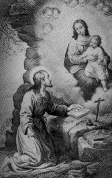"Each in his place, with his own heart, with his own wants, with his own thoughts, with his own intention, with his own prayers, separate but concordant, watching what is going on, watching its progress, uniting in its consummation;—not painfully and hopelessly following a hard form of prayer from beginning to end, but, like a concert of musical instruments, each different, but concurring in a sweet harmony, we take our part with God's priest, supporting him, yet guided by him."
Can we find any more personal yet communal expression of the virtue of religion? Can we find an act of worship more intimate, where each individual is able to in effect offer up his own Mass?
In his seventh lecture on Certain Difficulties Felt by Anglicans in Catholc Teaching, Newman under the heading the Strength of the Catholic Church writes:
"This being the state of the case, consider how entirely the reasonable anticipation of our minds is fulfilled in the professions of the Catholic Church. A Protestant wanders into one of our chapels; he sees a priest kneeling and bowing and throwing up a thurible, and boys in cottas going in and out, and a whole choir and people singing amain all the time, and he has nothing to suggest to him what it is all about; and he calls it mummery, and he walks out again. And would it not indeed be so, my brethren, if this were all? But will he think it mummery when he learns and seriously apprehends the fact, that, according to the belief of a Catholic, the Word Incarnate, the Second Person of the Eternal Trinity, is there bodily present,—hidden, indeed, from our senses, but in no other way withheld from us? He may reject what we believe; he will not wonder at what we do. And so, again, open the Missal, read the minute directions given for the celebration of Mass,—what are the fit dispositions under which the Priest prepares for it, how he is to arrange his every action, movement, gesture, utterance, during the course of it, and what is to be done in case of a variety of supposable accidents. What a mockery would all this be, if the rite meant nothing! But if it be a fact that God the Son is there offered up in human flesh and blood by the hands of man, why, it is plain that no rite whatever, however anxious and elaborate, is equal to the depth of the overwhelming thoughts which are borne in upon the mind by such an action. Thus the usages and ordinances of the Church do not exist for their own sake; they do not stand of themselves; they are not sufficient for themselves; they do not fight against the State their own battle; they are not appointed as ultimate ends; but they are dependent on an inward substance; they protect a mystery; they defend a dogma; they represent an idea; they preach good tidings; they are the channels of grace. They are the outward shape of an inward reality or fact, which no Catholic doubts, which is assumed as a first principle, which is not an inference of reason, but the object of a spiritual sense."
Keep in mind this was written by a man born into an Evangelical family, ordained an Anglican minister and finally received into the Catholic Church. A man who searched the Scriptures and Fathers to find the true faith, and the true body and bride of Christ.


